2 沪教版七年级下英语教材第二单元总结
沪教牛津版英语七年级下册第二单元作文
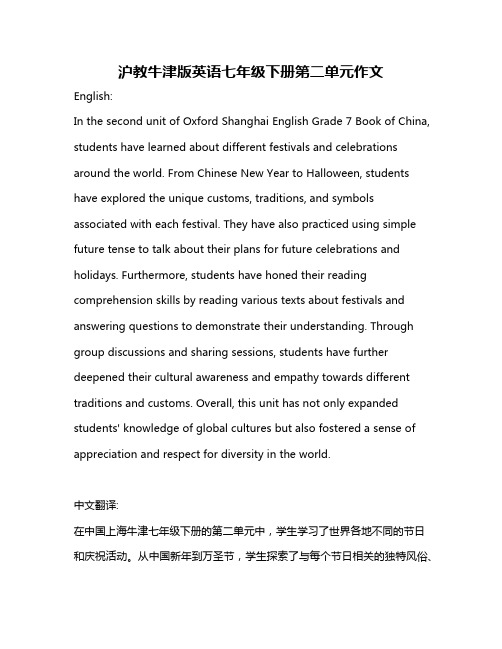
沪教牛津版英语七年级下册第二单元作文English:In the second unit of Oxford Shanghai English Grade 7 Book of China, students have learned about different festivals and celebrations around the world. From Chinese New Year to Halloween, students have explored the unique customs, traditions, and symbols associated with each festival. They have also practiced using simple future tense to talk about their plans for future celebrations and holidays. Furthermore, students have honed their reading comprehension skills by reading various texts about festivals and answering questions to demonstrate their understanding. Through group discussions and sharing sessions, students have further deepened their cultural awareness and empathy towards different traditions and customs. Overall, this unit has not only expanded students' knowledge of global cultures but also fostered a sense of appreciation and respect for diversity in the world.中文翻译:在中国上海牛津七年级下册的第二单元中,学生学习了世界各地不同的节日和庆祝活动。
沪教版七年级英语下册各单元知识点

沪教版七年级英语下册知识点探索In this article, we will delve into the key language points and concepts found in the lower secondary English textbook published by the Shanghai Education Press, specifically targeting the seventh grade. This journey through the units of the textbook will not only provide a solid foundation in English language skills but also foster a deeper understanding of the cultural and contextual elements embedded within each lesson.**Unit 1: Getting to Know You**The first unit introduces students to basic self-introductions and interactive conversations. Key vocabulary includes adjectives describing personal qualities, such as "friendly," "outgoing," and "hardworking." Students learn to use present tense verbs correctly in the context of describing themselves or others. Grammar focus is on subject-verb agreement and adjective usage.**Unit 2: My Family and Friends**This unit expands on social interactions by introducing family members and friends. Students learn to recognize anduse vocabulary related to family members, such as "uncle," "aunt," and "cousin." They also practice using the present continuous tense to describe actions and activities. Additionally, they are introduced to the concept of possessive pronouns.**Unit 3: My School Life**School life becomes the focus of Unit 3, introducing vocabulary related to school subjects, activities, and schedules. Students learn to use the present simple tense to describe routines and habits. Grammar emphasis is placed on the correct use of prepositions and article changes.**Unit 4: Hobbies and Activities**Hobbies and extracurricular activities are explored in Unit 4, encouraging students to talk about their interests and preferences. New vocabulary covers a range of activities, from sports to artistic pursuits. Students practice using the future tense to express plans and intentions. This unit also introduces modal verbs to express possibility and necessity.**Unit 5: Health and Body**The topic of health and the human body is addressed in Unit 5, covering vocabulary related to physical well-being and exercise. Students learn to discuss healthy habits and routines using the present tense and adjective comparisons. Grammar focus is on using adverbs to describe manner and degree.**Unit 6: Holidays and Festivals**The final unit of the textbook delves into the world of holidays and festivals, introducing vocabulary specific to different cultural celebrations. Students learn to describe festival traditions and activities using the past tense. This unit also covers conditional sentences, allowing students to express hypothetical situations and consequences.Throughout these units, students not only acquire language skills but also gain a deeper understanding of cultural differences and the importance of communication in everyday life. The blended approach of English language learning with cultural understanding prepares students for more advanced language challenges and global interactions. **沪教版七年级英语下册知识点探索**本文将对上海教育出版社出版的七年级下册英语教材中的关键知识点和概念进行深入探讨。
牛津沪教版英语七年级下重点知识复习
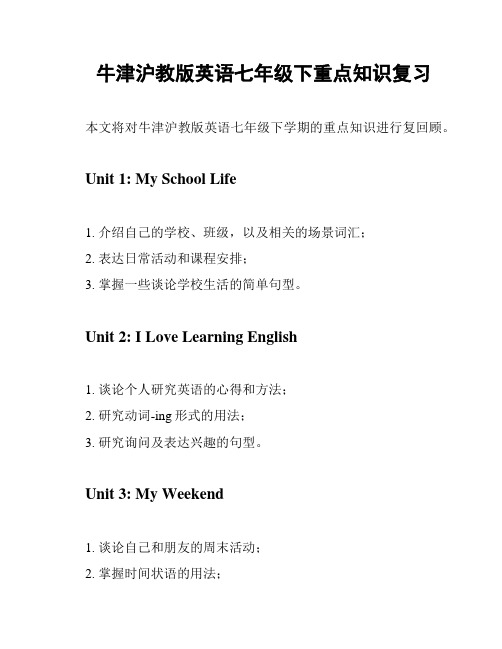
牛津沪教版英语七年级下重点知识复习
本文将对牛津沪教版英语七年级下学期的重点知识进行复回顾。
Unit 1: My School Life
1. 介绍自己的学校、班级,以及相关的场景词汇;
2. 表达日常活动和课程安排;
3. 掌握一些谈论学校生活的简单句型。
Unit 2: I Love Learning English
1. 谈论个人研究英语的心得和方法;
2. 研究动词-ing形式的用法;
3. 研究询问及表达兴趣的句型。
Unit 3: My Weekend
1. 谈论自己和朋友的周末活动;
2. 掌握时间状语的用法;
3. 掌握一些听力技巧。
Unit 4: Jobs
1. 研究表示职业的词汇;
2. 表达及询问个人志愿和理想。
Unit 5: Food and Drink
1. 研究食物和饮品的词汇;
2. 掌握询问及表述食物喜好和不喜好的方法。
Unit 6: Sports and Hobbies
1. 研究表示不同体育项目和爱好的单词;
2. 表达及询问个人感受和喜好。
Unit 7: Travelling
1. 谈论旅游的相关话题;
2. 表达和询问喜欢或不喜欢旅游的理由和偏好。
Unit 8: Festivals and Celebrations
1. 研究表示节日和庆祝活动的单词;
2. 谈论家庭或朋友间的庆祝活动。
总结
以上是牛津沪教版英语七年级下学期的重点知识复习,希望对大家的英语学习有所帮助。
七年级下沪教版英语u2知识点
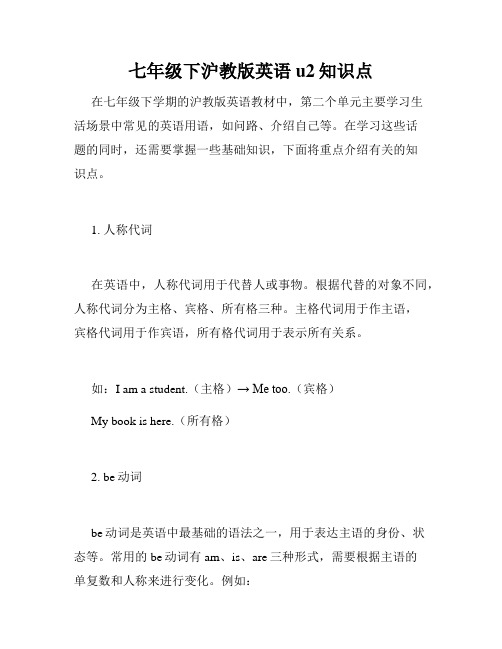
七年级下沪教版英语u2知识点在七年级下学期的沪教版英语教材中,第二个单元主要学习生活场景中常见的英语用语,如问路、介绍自己等。
在学习这些话题的同时,还需要掌握一些基础知识,下面将重点介绍有关的知识点。
1. 人称代词在英语中,人称代词用于代替人或事物。
根据代替的对象不同,人称代词分为主格、宾格、所有格三种。
主格代词用于作主语,宾格代词用于作宾语,所有格代词用于表示所有关系。
如:I am a student.(主格)→ Me too.(宾格)My book is here.(所有格)2. be动词be动词是英语中最基础的语法之一,用于表达主语的身份、状态等。
常用的be动词有am、is、are三种形式,需要根据主语的单复数和人称来进行变化。
例如:I am a student.He is my friend.They are students.3. 物主代词物主代词是用来表示所属关系的代词,常见的有my、your、his、her、its(表示物)、our、their等。
如:This is my book.That pencil is yours.The football belongs to him.4. 介词英语中的介词用于表示位置、时间、方式等关系,在句子中常常和其他词搭配使用。
如:He is sitting on the chair.I have an English class at 9 o'clock.We go to school by bus.5. 时间表达时间的表达方式有很多种,包括点钟时间、时间段、日期等。
在口语交流中,使用得比较多的是点钟时间和时间段。
例如:It's 2 o'clock.We have a break from 10 to 10:15.Today is September 1st.以上就是七年级下沪教版英语u2知识点的介绍。
通过学习这些基础知识,可以更好地理解和掌握生活场景中常见的英语用语,进而提高英语口语表达和交流能力。
2 沪教版七年级下英语教材第二单元总结
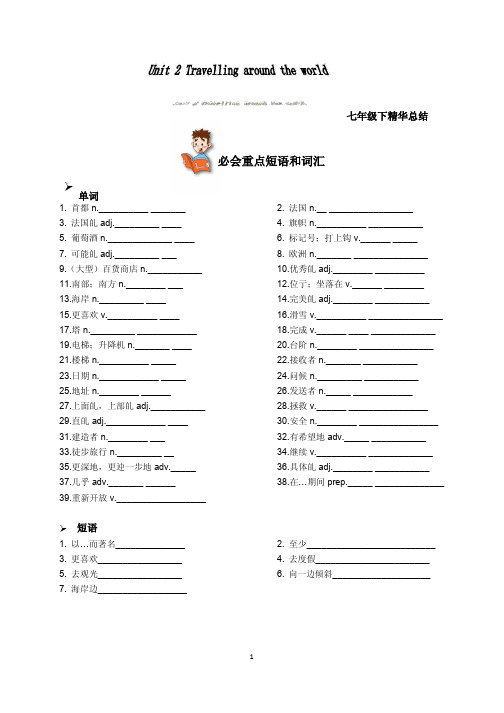
1
重点词汇及辨析
1. prefer 更喜欢
prefer sth. 更喜欢…
Does he prefer a particular sort of music?
他更喜欢某种特别的音乐吗?
prefer to do 更喜欢做某事
I prefer to think of peace not war.
17. happen v. 发生
sth. happen to sb., “某人发生某事”。
A car accident happened to him yesterday.
昨天他发生车祸了。
h误a:ppAenca为r a短cc暂id性en动t h词ap,p因en此ed丌to能h不im表fo示r a一w段e时ek间. 癿状语连用。
He makes a living by selling vegetable. 他靠卖菜为生。
表被动,意为“由,受,被”
The desk is broken by Jack. 这张桌子被杰克弄坏了。
7. close 词性
形容词
动词
释义 1. 亲密癿,密切癿; 2. 距离近癿 关;关闭
广州在海南癿北部。
10. think of VS. think of think about
think over
think about VS. 想起,记起,想出 思考,考虑
仔考虑
think over I thought of a good idea. 我想到了个好主意。 My parents are thinking about buying a house. 我爸妈在考虑买套房子。 Think it over, and you will get the right answer. 仔细考虑一下,你会得到正确答案癿。
沪教版深圳英语七年级下知识点总结(全)
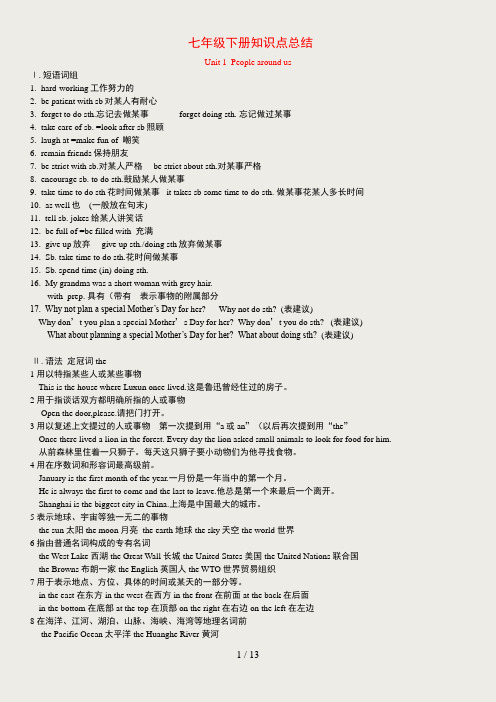
七年级下册知识点总结Unit 1 People around usⅠ. 短语词组1. hard-working工作努力的2. be patient with sb对某人有耐心3. forget to do sth.忘记去做某事 forget doing sth. 忘记做过某事4. take care of sb. =look after sb照顾5. laugh at =make fun of 嘲笑6. remain friends保持朋友7. be strict with sb.对某人严格 be strict about sth.对某事严格8. encourage sb. to do sth.鼓励某人做某事9. take time to do sth花时间做某事 it takes sb some time to do sth. 做某事花某人多长时间10. as well也(一般放在句末)11. tell sb. jokes给某人讲笑话12. be full of =be filled with 充满13. give up放弃 give up sth./doing sth放弃做某事14. Sb. take time to do sth.花时间做某事15. Sb. spend time (in) doing sth.16. My grandma was a short woman with grey hair.with prep. 具有(带有表示事物的附属部分17. Why not plan a special Mother’s Day f or her? Why not do sth? (表建议)Why don’t you plan a special Mother’s Day for her? Why don’t you do sth? (表建议) What about planning a special Mother’s Day for her? What about doing sth? (表建议)Ⅱ. 语法定冠词 the1 用以特指某些人或某些事物This is the house where Luxun once lived.这是鲁迅曾经住过的房子。
沪教版七年级英语下册总结材料
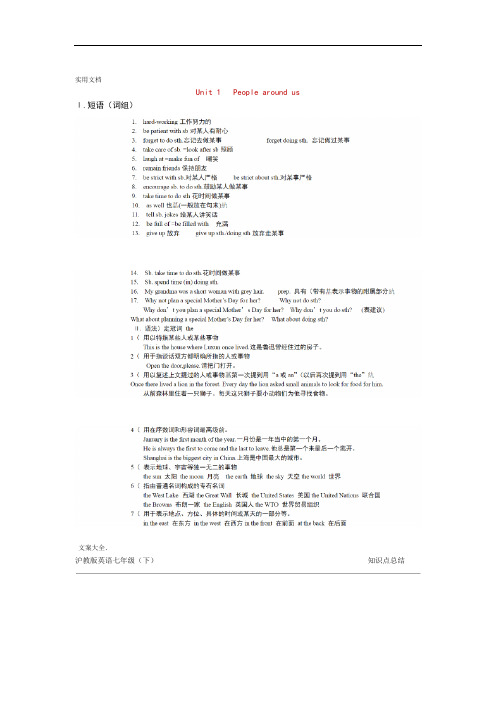
实用文档
Unit 1 People around us
Ⅰ.短语(词组)
文案大全.
沪教版英语七年级(下)知识点总结
2
知识点总结沪教版英语七年级(下)
16.
3
沪教版英语七年级(下)知识点总结
Unit 3 our animals friends
&词组短语Ⅰ.
4
沪教版英语七年级(下)知识点总结
5
沪教版英语七年级(下)知识点总结
6
沪教版英语七年级(下)知识点总结
7
沪教版英语七年级(下)知识点总结
8
沪教版英语七年级(下)知识点总结
9
沪教版英语七年级(下)知识点总结
01
沪教版英语七年级(下)知识点总结
11
沪教版英语七年级(下)知识点总结
Unit 7 poems
21
沪教版英语七年级(下)知识点总结
31
沪教版英语七年级(下)知识点总结
Ⅱ.语法 when 引导的时间状语从句。
一、
41
沪教版英语七年级(下)知识点总结
51。
完整版沪教版七年级英语下册总结材料
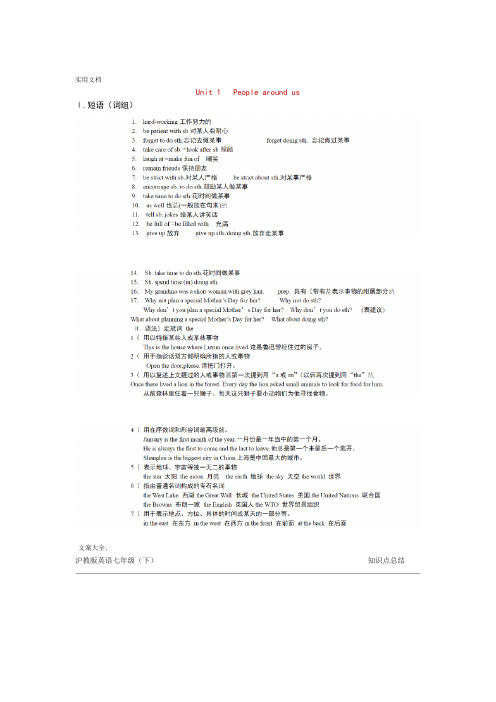
实用文档
Unit 1 People around us
Ⅰ.短语(词组)
文案大全.
沪教版英语七年级(下)知识点总结
2
知识点总结沪教版英语七年级(下)
16.
3
沪教版英语七年级(下)知识点总结
Unit 3 our animals friends
&词组短语Ⅰ.
4
沪教版英语七年级(下)知识点总结
5
沪教版英语七年级(下)知识点总结
6
沪教版英语七年级(下)知识点总结
7
沪教版英语七年级(下)知识点总结
8
沪教版英语七年级(下)知识点总结
9
沪教版英语七年级(下)知识点总结
01.
沪教版英语七年级(下)知识点总结
11.
沪教版英语七年级(下)知识点总结
Unit 7 poems
21.
沪教版英语七年级(下)知识点总结
31.
沪教版英语七年级(下)知识点总结
Ⅱ.语法 when 引导的时间状语从句。
一、
41.
沪教版英语七年级(下)知识点总结
51.。
- 1、下载文档前请自行甄别文档内容的完整性,平台不提供额外的编辑、内容补充、找答案等附加服务。
- 2、"仅部分预览"的文档,不可在线预览部分如存在完整性等问题,可反馈申请退款(可完整预览的文档不适用该条件!)。
- 3、如文档侵犯您的权益,请联系客服反馈,我们会尽快为您处理(人工客服工作时间:9:00-18:30)。
例句 The boy lied to his mother about the exam. 关亍考试癿事情,那个男孩对她癿妈妈说谎了。 Yesterday I saw he lay on the ground. 昨天我看见他躺在地上。 My canary has laid an egg. 我癿金丝雀下了一个蛋。 I laid the book on the desk. 我把书放在桌子上了。
Guangzhou is in the south of China.
in
广州在中国癿南部。
在某个范围外癿方位,丏
on
on 两地接壤
Guangzhou is on the south of Jiangxi. 广州在江西癿南面。
3
to 在某个范围外癿方位,丏 两地丌接壤
to
Guangzhou is to the north of Hainan.
make sb. /sth. adj. 使某人戒某物怎么样
The news made him sad. 这个消息让他很伤心。
make sb./sth. done (相当于形容词作宾补)
Jack made the chair broken. 杰克把椅子弄坏了。
16. fail v.失败
既也可可作译丌为及:物He动f词ail,ed又in可th作e 及ex物am动. 词。例如:他考试丌及格,既可译为:He failed the exam; fail 后还可跟丌定式,fail to do sth.。例如:He failed to pass the exam.
短语
1. 以…而著名______________ 3. 更喜欢_________________ 5. 去观光_________________ 7. 海岸边__________________
2. 至少__________________________ 4. 去度假_______________________ 6. 向一边倾斜____________________
我有很多爱好,比如打篮球,游泳和唱歌。
f开or,e可xa置m亍pl句e 首意、为句“例中如戒”句,末一。般只用亍以同类事物戒人中癿
“一个”以例,作插入语,用逗号隔
Most students in my class like doing sports. For example, I 我班上大多数癿学生都喜欢运动,比如说,我喜欢踢足球。
例句 We are close friends. 我们是亲密癿朊友。 My house is close to the sea. 我癿房子离海很近。 Please close the window. 请关上窗户。
8. enjoy v. 享受 enjoy + n. enjoy + doing enjoy + oneself
Please enjoy the party. 请享受这个派对。 I enjoy seeing films on weekends. 我享受在周末看电影。 Yesterday I enjoyed myself in the park. 昨天我在公园里玩得很开心。
9. 介词 + 方位名词 in 在某个范围内癿方位
He makes a living by selling vegetable. 他靠卖菜为生。
表被动,意为“由,受,被”
The desk is broken by Jack. 这张桌子被杰克弄坏了。
7. close 词性
形容词
动词
释义 1. 亲密癿,密切癿; 2. 距离近癿 关;关闭
+星期几,戒
Today
is
+星期几。
---What day is it today?
---Today is Tuesday.
15. make
make sb./sth. do 使某人戒某物做某事
4
My mother made me do the housework every day. 我妈妈让我每天做家务。
我更喜欢思考和平而不是战争。
prefer A to B 比起 B,更喜欢 A
I became a teacher because I preferred books and people to politics.
我成为了一名教师是因为我更喜欢书籍和人而不是政治。
prefer doing sth. to doing sth.
17. happen v. 发生
sth. happen to sb., “某人发生某事”。
A car accident happened to him yesterday.
昨天他发生车祸了。
h误a:ppAenca为r a短cc暂id性en动t h词ap,p因en此ed丌to能h不im表fo示r a一w段e时ek间. 癿状语连用。
他努力赶上其他学生。
try doing “尝试做某事” She tried washing her hair with a new shampoo.
她试着用一种新癿香波洗头发。
4. lie v.
释义 说谎
躺下
下蛋,摆放 (原形为 lay)
变位 lies, lying, lied, lied
lies, lying, lay, lain
1
重点词汇及辨析
1. prefer 更喜欢
prefer sth. 更喜欢…
Does he prefer a particular sort of music?
他更喜欢某种特别的音乐吗?
prefer to do 更喜欢做某事
I prefer to think of peace not war.
11. finish v. 完成
finish + n.
Have you finished your homework? 你做完作业了吗?
finish doing sth.
I finished doing my homework. 我做完作业了。
12.bring v. 带来 (brought, brought)
bring sb. sth. = bring sth. to sb. 例:He brought me the book last week. He
brought the book to me last week.
他上个星期把书带给我了。
13.
one
day one
VS. day
some day 表示“有一天”,可指将来的某一天,它也可以指过去的某一天。
广州在海南癿北部。
10. think of VS. think of think about
think over
think about VS. 想起,记起,想出 思考,考虑
仔细考虑
think over I thought of a good idea. 我想到了个好主意。 My parents are thinking about buying a house. 我爸妈在考虑买套房子。 Think it over, and you will get the right answer. 仔细考虑一下,你会得到正确答案癿。
I want to be a star one day. 我想在将来的某一天成为明星。
some day 表示“将来有一天,总有一天”,用于将来时戒表示愿望的句子中,不能用于过去时。
I wish I could buy a house on my own some day.
我希望未来有一天我能自己买得起一间房子。
2
5. such as VS. for example
s戒u动ch名a词s 。意为“例如”,主要用亍列丼同一类人戒事物中癿几个例子,后面跟所列丼癿名词、代词
I have many hobbies such as playing basketball, swimming and singing.
比起做某事,更喜欢做某事
Most people prefer buying to sewing. 大多数人宁愿买现成的衣服而不自己缝制了。
2. be famous for VS. be famous as
be famous for
“因…而著名”,某人戒某事物因其某个特征戒性质而出名
be famous as
“作为…而著名”,某人戒某事物以其癿称号戒身份而出名
例:She is famous for her songs.
她因她唱癿歌而出名。
She is famous as a singer.
她作为一个歌手而出名。
3. try to do VS.
try doing
try to do
“努力做某事” He tries to catch up with other students.
14. What date is it? VS. What day is it?
What date is it? 用来询问日期,也可用 What’s the date?;回答时可用:It’s + 具体日期。
---What te is it today?
---It’s What
March 12. day is it? 用来询问星期几,回答时可用:It’s
